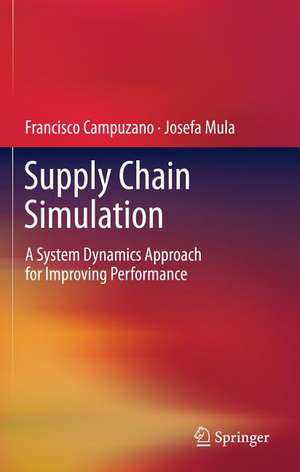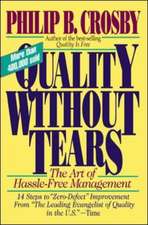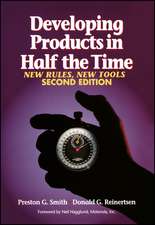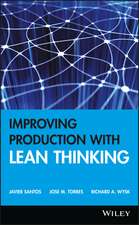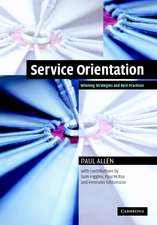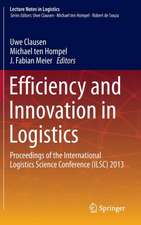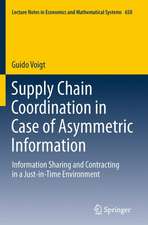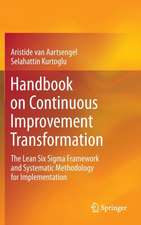Supply Chain Simulation: A System Dynamics Approach for Improving Performance
Autor Francisco Campuzano, Josefa Mulaen Limba Engleză Hardback – 16 iul 2011
- knowledge of simulation methods and techniques,
- the conceptual framework of a typical supply chain,
- the main concepts of system dynamics, and
- a set of practice problems with their corresponding solutions.
The objective of Supply Chain Simulation is to meet the demands of supply chain simulation or similar courses taught at the postgraduate level. The “what if” analysis recreates different simulation scenarios to improve the decision-making process in terms of supply chain performance, making the book useful not only for postgraduate students, but also for industrial practitioners.
| Toate formatele și edițiile | Preț | Express |
|---|---|---|
| Paperback (1) | 631.53 lei 6-8 săpt. | |
| SPRINGER LONDON – 19 aug 2014 | 631.53 lei 6-8 săpt. | |
| Hardback (1) | 554.41 lei 39-44 zile | |
| SPRINGER LONDON – 16 iul 2011 | 554.41 lei 39-44 zile |
Preț: 554.41 lei
Preț vechi: 693.01 lei
-20% Nou
Puncte Express: 832
Preț estimativ în valută:
106.09€ • 110.55$ • 87.84£
106.09€ • 110.55$ • 87.84£
Carte tipărită la comandă
Livrare economică 31 martie-05 aprilie
Preluare comenzi: 021 569.72.76
Specificații
ISBN-13: 9780857297181
ISBN-10: 085729718X
Pagini: 116
Ilustrații: VII, 106 p.
Dimensiuni: 155 x 235 x 11 mm
Greutate: 0.32 kg
Ediția:2011
Editura: SPRINGER LONDON
Colecția Springer
Locul publicării:London, United Kingdom
ISBN-10: 085729718X
Pagini: 116
Ilustrații: VII, 106 p.
Dimensiuni: 155 x 235 x 11 mm
Greutate: 0.32 kg
Ediția:2011
Editura: SPRINGER LONDON
Colecția Springer
Locul publicării:London, United Kingdom
Public țintă
ResearchCuprins
1. Introduction to Supply Chain Simulation.- 2. Conceptual Framework for Supply Chain Simulation.- 3. Bullwhip Effect in Supply Chains.- 4. System Dynamics: Main Concepts.- 5. Starting to Model the Supply Chain. Warehouse Management.- 6. Modeling a Traditional Supply Chain by Using Causal Loop Diagrams.- 7. Getting into Practice. Modeling an Entire Traditional Supply Chain.
Recenzii
From the reviews:
“The authors, who are business management professors at different Spanish universities, succinctly present, explain, and summarize research on various concepts relating to our evolutionary understanding of supply chain theory and management in recent decades. … This book is a gem in terms of being compact, comprehensive, and yet concise … . I would characterize this book in its current form as a diamond … .” (Greg H. Parlier, Interfaces, Vol. 43 (1), January–February, 2013)
“The authors, who are business management professors at different Spanish universities, succinctly present, explain, and summarize research on various concepts relating to our evolutionary understanding of supply chain theory and management in recent decades. … This book is a gem in terms of being compact, comprehensive, and yet concise … . I would characterize this book in its current form as a diamond … .” (Greg H. Parlier, Interfaces, Vol. 43 (1), January–February, 2013)
Notă biografică
Dr. Francisco Campuzano is Senior Lecturer in the Business Management Department at the Technical University of Cartagena (UPCT) in Spain. Having graduated in 2000 in Management Engineering, in 2006 he received a PhD degree in Management from the Universitat Politècnica de València. His doctoral thesis was rewarded with honours by the Spanish Logistics Centre (CEL) in 2007. His main fields of research are focused on the modeling and simulation of supply chain systems and production management using the system dynamics methodology. He has published several papers in national and international journals and international conference proceedings. He has also participated in several national and international research and education projects and is an active member of the Systems Dynamic Society and the Mediterranean Institute for Advanced Studies (MEDIFAS). He is a reviewer for several international journals.
Dr. Josefa Mula is Senior Lecturer at Universitat Politécnica de València (UPV) in Spain where she teaches supply chain simulation, production management and operations research. She is Senior Researcher at the Research Centre of Production Management and Engineering (CIGIP) of UPV. Her research interests are oriented to production management, supply chain management and uncertainty modelling in production management. She has written (in collaboration) more than forty articles in international journals. She is member of the editorial board of the Journal of Industrial Engineering and Management. She has participated and continues to participate in various European projects (VCHAIN, ECOSELL, REMPLANET) and has led several national projects (EVOLUTION, REVOLUTION).
Dr. Josefa Mula is Senior Lecturer at Universitat Politécnica de València (UPV) in Spain where she teaches supply chain simulation, production management and operations research. She is Senior Researcher at the Research Centre of Production Management and Engineering (CIGIP) of UPV. Her research interests are oriented to production management, supply chain management and uncertainty modelling in production management. She has written (in collaboration) more than forty articles in international journals. She is member of the editorial board of the Journal of Industrial Engineering and Management. She has participated and continues to participate in various European projects (VCHAIN, ECOSELL, REMPLANET) and has led several national projects (EVOLUTION, REVOLUTION).
Textul de pe ultima copertă
Supply Chain Simulation allows readers to practice modeling and simulating a multi-level supply chain. The chapters are a combination of the practical and the theoretical, covering:
The objective of Supply Chain Simulation is to meet the demands of supply chain simulation or similar courses taught at the postgraduate level. The “what if” analysis recreates different simulation scenarios to improve the decision-making process in terms of supply chain performance, making the book useful not only for postgraduate students, but also for industrial practitioners.
- knowledge of simulation methods and techniques,
- the conceptual framework of a typical supply chain,
- the main concepts of system dynamics, and
- a set of practice problems with their corresponding solutions.
The objective of Supply Chain Simulation is to meet the demands of supply chain simulation or similar courses taught at the postgraduate level. The “what if” analysis recreates different simulation scenarios to improve the decision-making process in terms of supply chain performance, making the book useful not only for postgraduate students, but also for industrial practitioners.
Caracteristici
Shows readers how to simulate a multi-level supply chain by using the system dynamics methodology Includes illustrations and graphs related to simulation results from the Vensim program, whose main programming code is also provided Contains practice problems and solutions
